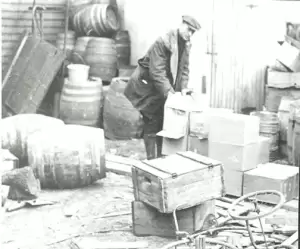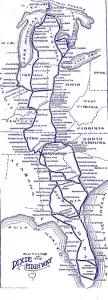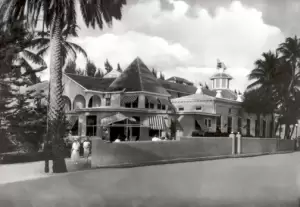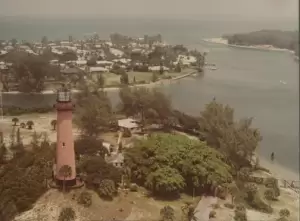Prohibition

During Prohibition (1920 to 1933), it was illegal to make, transport, or sell liquor in the United States. Until most of the members were killed in 1924, the Ashley gang made moonshine, smuggled liquor from the Bahama Islands, and hijacked illegal cargo from others. Because Prohibition was an unpopular law, breaking it without violence was acceptable to many ordinary citizens. Moonshining and bootlegging were lucrative businesses, especially during the difficult years after the boom ended.
The same year the Ashley gang died, Zell Davis of Pahokee, a successful trapper and hunter, married Olive Rowena Griffin of Riviera Beach. His brothers-in-law Thomas Leonard “T. L.” and Berlin Griffin introduced Davis to the “fun and games” of bootlegging, as explained by his son, Zell Davis, Jr., who became state’s attorney, in a 2004 oral history interview:
Berlin … would go out at the crack of dawn to go king fishing. ... As the day wore on, he would slowly keep drifting further and further away from the king fishing fleet, and when he felt like it was safe, he would slip over to the Bahamas, get his load of liquor loaded in the middle of the night back into his king fishing boat, come back over, and get there about daybreak. ... [T]hen he would go in with the fleet and unload his booze.
... [People] would ask him to bring liquor in, and they’d pay him a premium. ... [H]e hired boats and captains. ... And then it just got bigger and bigger and bigger, and he had boats that were taking liquor from Nassau all the way to New York. ... [H]e and Joe Kennedy [father of President John F. Kennedy] made their own deal and brought liquor into this country with partners. ...
Joe Risden, who had a gambling establishment here on Main Street—Royal Poinciana Way—lived on the lakefront just north of the golf course here in Palm Beach. In those days, it was all woods. You’d go down this long road, like a rut road, to his house, and there my dad would pick up liquor that had been dropped off the night before from some boat that came in from the Bahamas. ... [E]veryone knew it, but they didn’t know it. ...
When I [was] state’s attorney, [T. L.] Griffin ... said one day at our Thanksgiving dinner ... “I’ve never met a politician I couldn’t buy.” ... He went on to explain that he had paid federal judges, he had paid circuit judges, he had paid sheriffs—he owned everybody. And he cited examples and names and how he’d give this guy a car and this guy so much booze and—as we know, Prohibition was not well received by the populace. ... [T]hey were never arrested. Their men were arrested, but they’d bail them out immediately and then that would be the end of the case.Zell Davis, Jr.
Casualties of Prohibition
Bradley’s Beach Club
My Dada reached Captain [Irving] Hiscock and sent him to Nassau to charter a schooner, load it with the inventory listed, take it to the west end of Grand Bahama [Island], and set it up for delivery into Palm Beach. Fishing skiffs were secured and loaded and came over in broad daylight and unloaded into A[lexander] B. Otwell’s trucks at the foot of Sunset Avenue, thence into storage at the club. … They first used chicken wire to enclose the cargo ashore; later they constructed a warehouse.
T. T. Reese, Jr.
Often in the night, the sound of a high-powered motor could be heard above the breaking of ground swells as the heavily laden rum boats entered the inlet. The three branches of the Loxahatchee, the inland waterway and the Indian River offered coves and dense cover where the liquor could be concealed or unloaded.
One dark and windy night in February 1925 such a boat loaded with choice liquors, capsized on the bar. The rumrunners jumped for their lives. As they swam in the chilly water, the boat unbelievably righted itself, circled them and then ran upon the beach south of the inlet. The rumrunners managed to swim ashore. At daybreak another boat arrived and began to salvage the precious "hams" of liquor, as the burlap sacks holding the bottles were called. When townspeople and fishermen began to arrive, the rumrunners withdrew. Fishermen hooking into the burlap bags spilled into the surf had a memorable day of sport.Bessie Wilson Dubois
 Carlin White lived west of the Dubois home, at the Carlin House. He told The Jupiter Courier in 2000 that the Town of Jupiter rented one of his boats for $35; he learned later they wanted it to pursue smugglers. The Ashley gang also “borrowed” one of his boats for a run to the Bahamas, but they neither paid nor asked White beforehand.
Carlin White lived west of the Dubois home, at the Carlin House. He told The Jupiter Courier in 2000 that the Town of Jupiter rented one of his boats for $35; he learned later they wanted it to pursue smugglers. The Ashley gang also “borrowed” one of his boats for a run to the Bahamas, but they neither paid nor asked White beforehand.
Dixie Highway came close to Jupiter Inlet, providing a north-south route by land. White recalled being kept awake by the sound of trucks transporting the contraband away from town, sometimes hundreds of trips per night.
Moonshine and Corruption
Illegal liquor, or moonshine, was produced in homemade stills, usually at night to hide the smoke they emitted. In 1928 The Palm Beach Post reported that “one of the largest stills ever,” of about 1,000-gallon capacity, had been seized by Prohibition agents northeast of Kelsey City (now Lake Park) after a brief gunfight; five people were arrested. Another still of about 500 gallons had been seized near Jupiter, where residents later spoke of the woods being filled with the moonshine makers.
If the citizenry was tempted to profit from Prohibition, so were the officials charged with enforcing it. In 1928 Jupiter Mayor Charles Bennet recommended the removal of Vice Mayor R. C. Albertson and police officer James Williams for not turning in seized liquor, as well as Jupiter’s commissioner of public welfare, J. Frederick Turner, who oversaw the police department. Turner later became mayor of Jupiter; Williams was a Palm Beach County Sheriff’s deputy.



